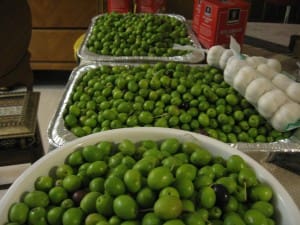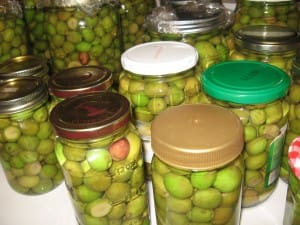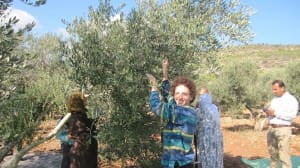One of my close friends called today to say, “I know this is pretty bold of me, but I was wondering if you’re going to cure olives again this year. I’ve been craving them so. Could you give me two jars this time?”

My dear friend isn’t Arab–she’s just got a taste for olives. She has no idea what goes through my mind while I’m picking and sorting through the bins of fresh olives at the Arabic market in my southern California neighborhood. She couldn’t imagine what I think about while I’m hauling home 39 pounds of them, washing and cracking them on my kitchen counter, tossing away most of the leaves and twigs but keeping a few “because it’s good for them to stay together” as my grandmother used to say.
It’s olive harvest season in Palestine, but so many of the laden branches will go unpicked or be crushed under an Israeli bulldozer while farmers weep in the distance. These trees, many of them quite ancient, stand in stately rows while their fruit develops over the course of months. And when the moment is just right and the olives are still “hard, but not too hard, habibti,” it’s important to pick them to arrest the ripening process so that they will cure to a consistent flavor throughout the batch.
The practice of bulldozing olive groves or setting them on fire began some years ago as one of the many measures of collective punishment imposed by the Israeli Defense Forces (IDF). The first time I saw pictures of trees being crushed under military bulldozers, I wept out loud. Knowing the decades of devoted attention given to those gnarled branches, it looked to me like a picture of babies being smashed to death. I still feel sick whenever I hear that a grove was destroyed by soldiers on the night before harvest. It’s so different than hearing that the trees were uprooted by a flood or succumbed to some soil-borne virus. This is murder.
Olive trees are among a handful of sources from which Palestinians can earn a livelihood even under occupation. If a family is lucky enough to still maintain control of their land (as opposed to simply holding title through a virtually worthless deed), they can raise crops or animals, but both require regular access to water which of course has been redirected away from Palestinian villages in many cases. Olives, however, will grow robustly with only sun and the rain gifted by God. Olive trees give rise not only to the olive industry but oil, soap, and, now, wood carvings lovingly fashioned from the wood of trees murdered in the night. Praying hands, figurines of the magi, latticed stands for the Holy Qur’an reveal the knot holes from the fruit-bearing branches from which they were wrested.
These days, it’s fairly easy to find groups of Americans or Europeans traveling to Palestine to assist with the olive harvest. Rather than exploring traditional tourist sites, these folks come prepared to work hard, sometimes even sleeping among the trees along with the farmers in order to guard the grove.
Not that they could fend off the soldiers. Not that anyone could.
As has been proven year after agonizing year, nothing can fend off the soldiers. Or the settlers.

So yes, I tell my dear friend: I can certainly promise you two jars of olives this year. Maybe three. It’s a painstaking, labor-intensive process that I happily undertake each autumn, distributing dozens of jars among my family and friends at Christmastime. I do it because I can. And I do it for the women who can’t; the women who, along with their families, watched their trees carefully to determine just to right time for harvest, but who woke in the night to the sound of thunder. Or so they thought.
And here’s a bonus picture of me (Nora) picking olives in Palestine:

Such a beautiful piece. I’m thinking this topic would make a very moving short film. Just the seedlings of an idea right now (no pun intended!) The story of an olive grove in Palestine…I will have to have a think on this!
Did you know that my children’s picture book, co-authored with illustrator Danna Masad, is a poetic tale of an olive tree telling her story to the Palestinian children all over the world to yearn to return. I hope we find an agent soon, then a publisher, and then YOU can write the screenplay, Bisanne!
exciting, i would love to see such a picture book, and it would make a beautiful film, either a documentary or an animated one!
Me too! We need to put some pressure on our friend Vicki to publish!.
I read this essay two hours ago, and I can’t stop thinking about the olive trees. What a heartbreaking story. Thank you, Vicki, for opening our eyes.
Keep thinking! Tell others!
Dear Catherine, what moves your heart will move others’. Some people are a bit turned off to the idea of learning about Israel/Palestine from a political perspective. But that same person might be open to the same information if it’s presented through the issue of olive groves being uprooted. Just an idea….
Vicki, thanks for sharing these links with me: From the Guardian http://www.guardian.co.uk/world/2012/oct/15/israel-oliver-trees-settler-attacks, and the link to the OCHA fact sheet on olive trees (which I can’t link to but folks can search for)!
Very true…moving me,who is now so tired of only hearing the political viewpoints.I buy olive oil made in Palestine from a friend in ABQ, New Mexico. Its a product of Canaan Fair Trade, West Bank – called Nabali Tree Olive Oil – from a farmer cooperative. I usually do not pay as much for oil olive, but this benefits the cooperative, and that moves me!
Those little things we do in the course of our daily lives do, I believe, make a cumulative difference.
I just got this email (Dec. 2, 2012) and wanted to share the info with those who may be interested:
On behalf of the Olive Tree Campaign – Keep Hope Alive – We would love to
invite you to participate in the 6th annual olive planting program, which
will take place February 2nd to 11th 2013.
Agricultural experts in Palestine estimate that over a million olive trees
have been uprooted and destroyed by Israel since it was created in 1948.
More than half of these olive trees were uprooted and destroyed in the past
decade. Disrespecting its’ religious, cultural, natural, nutritious and economic
value, the olive tree has been a constant target of the Israeli military
occupation under the guise of security, the construction of the Wall on
Palestinian lands and the continuous expansion of Israeli – Jewish only –
colonies (settlements). The destruction of olive trees has had intentional and destructive results
on the lives of many Palestinian farmers, land owners and the Palestinian
population in general. For these reasons and many others, the Olive Tree Campaign was launched in
2001 as a positive response to systematic destruction by addressing the
needs of the effected farmers. The Olive Tree Campaign uses the olive tree
as a tool to advocate for the Palestinians right to peace with justice. So
far 10 seasons of planting have helped hundreds of Palestinian farmers and
brought awareness to the expanding international network of friends and
partners about the real life of the Palestinians who have been striving for
peace with justice for more than 60 years.
You are all encouraged to pass the word about this event to people who might
be interested come to Palestine and to participate. Please review the invitation and the proposed schedule at:
http://www.jai-pal.org/content.php?page=1119 where you can also read reports
on similar previous events and watch some of the short films produced on the
Olive Tree Campaign.
For any other information, questions, concerns, or to request a registration
form, please contact: The Olive Tree Campaign officer at the Joint Advocacy Initiative of the East
Jerusalem YMCA and the YWCA of Palestine, via email at:
olivetree@jai-pal.org or by phone at (+970) 2 2774540.
Jawad Musleh, Alternative Tourism Group, program coordinator, via email at:
jawad@atg.ps or by phone at (+970) 2 2772151
Vicki,
I have never before been able to viscerally picture holding the olives in my hand, stripping them, curing them…and then to see them so beautifully in the jars! My mouth is watering as my heart hurts. Thank you so much for sharing this.
M.
When I first read Vicki’s piece, I actually cried.
Thank you so much. If you ever have a chance to see Walid Khalidi’s book, “Before Their Diaspora: A Photographic History of the Palestinians, 1876–1948” (Institute for Palestine Studies. ISBN 0-88728-144-3) or any of the collections of David Roberts’ paintings (http://commons.wikimedia.org/wiki/David_Roberts), you will see pictures of some of today’s olive groves back 150 years ago. The olive tree has marked so much of the history of Palestine whether through its culture, economy, topography…I have to wonder if that’s what drives the settlers and soldiers to do all they can to erase these groves as yet another way of erasing Palestine’s past and present.
You are so right, Jane. I think we have to take the long view or we get burned out quickly. Each day, we do what we can do that day. Then the next day, we do the same…. I hope that I won’t be violating a confidence by saying that Nora and I discovered that the uprooting of ancient olive trees by settlers and soldiers is one of the few things that moves us to tears. The loss of even one tree is devastating; farmers often name individual trees, having grown up playing under its branches and then, as an adult, surviving from its fruit.
I was very, very moved by Vicki’s post, “39 pounds of sorrow,” but I found it strangely uplifting too. To think that so many people, including Vicki and I (neither of whom is Palestinian) can be so connected to Palestine through trees! In fact, I’ve written a children’s picture book that features an olive tree with gorgeous illustrations by my co-author, Danna Masad. If it ever gets published, I think a whole new generation will find hope in the idea that the trees will be here waiting until there’s peace.
I love that image, Nora: the trees will be there waiting for us until there’s peace!
I don’t know what to say except thank you for the insight. It is truly heart-breaking. All we can do is go on resisting the occupation in whatever way we can, from the sidelines.